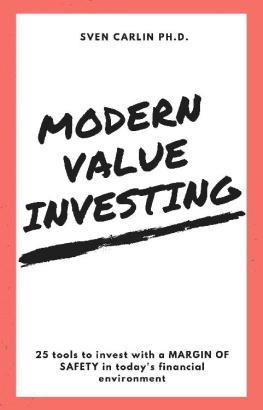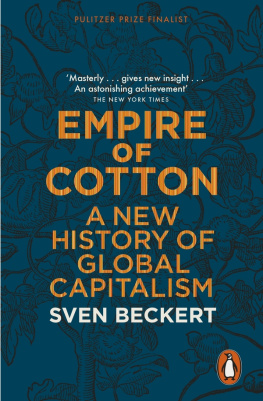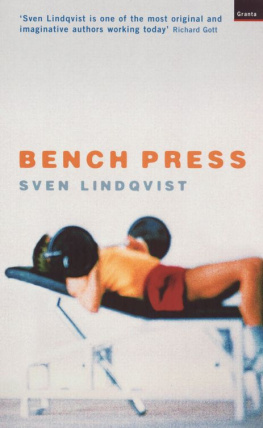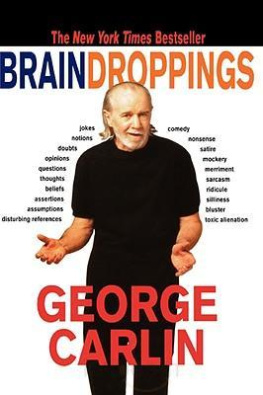Sven Carlin - Modern Value Investing
Here you can read online Sven Carlin - Modern Value Investing full text of the book (entire story) in english for free. Download pdf and epub, get meaning, cover and reviews about this ebook. year: 2018, genre: Science / Business. Description of the work, (preface) as well as reviews are available. Best literature library LitArk.com created for fans of good reading and offers a wide selection of genres:
Romance novel
Science fiction
Adventure
Detective
Science
History
Home and family
Prose
Art
Politics
Computer
Non-fiction
Religion
Business
Children
Humor
Choose a favorite category and find really read worthwhile books. Enjoy immersion in the world of imagination, feel the emotions of the characters or learn something new for yourself, make an fascinating discovery.
- Book:Modern Value Investing
- Author:
- Genre:
- Year:2018
- Rating:3 / 5
- Favourites:Add to favourites
- Your mark:
- 60
- 1
- 2
- 3
- 4
- 5
Modern Value Investing: summary, description and annotation
We offer to read an annotation, description, summary or preface (depends on what the author of the book "Modern Value Investing" wrote himself). If you haven't found the necessary information about the book — write in the comments, we will try to find it.
Modern Value Investing — read online for free the complete book (whole text) full work
Below is the text of the book, divided by pages. System saving the place of the last page read, allows you to conveniently read the book "Modern Value Investing" online for free, without having to search again every time where you left off. Put a bookmark, and you can go to the page where you finished reading at any time.
Font size:
Interval:
Bookmark:
Modern Value
Investing
SVEN CARLIN
Copyright 2018 Sven Carlin
ISBN: 9781980839071
All rights reserved.
Table of Contents
Dedicated to my wife Ana and son Val.
Special thanks to Aviad Daniely and all my YouTube supporters.
PREFACE
My personal goal is to help people reach their financial goals. One way of doing that is through investing education. This book is my attempt to help with the development of a strong investing mindset and skillset to enable the reader in making better investment decisions and finding better investments.
There is a gap within the value investing world. Benjamin Graham published The Intelligent Investor in 1949 with several subsequent editions up to 1972 while Seth Klarman published Margin of safety in 1991. More than 50 years have passed since Graham published his masterpiece and almost 30 since Klarman did the same. Therefore, there is the need for a contemporary book to account for all the changes the financial environment we live in.
The book has 4 parts. The first part discusses the most important psychological traits a successful investor should have. Part 2 describes 25 tools that will help with the actual investment analysis and part 3 applies those tools on an example. Part 4 is food for investing thought as it discusses modern approaches to investing from an all-weather portfolio strategy to hyperbolic discounting and other things you might find interesting or take advantage of when the time will be right, even if that might happen just a few times in your life.
Hope you enjoy the book and the videos posted on my YouTube channel. Sincerely appreciate your support.
BOOK 1
Chapter 1
Be greedy when others are fearful
and fearful when others are greedy
Benjamin Graham
(This quote is so important that it cant be overused)
The single greatest edge an investor can have is a long-term orientation. Seth Klarman
The thing that is mostly overlooked when discussing investment strategies is personal goals. Investing is extremely personal as we all work hard for our money and we are not investing just for the sake of investing. At the end of our investment process, there are some personal goals that are supposed to improve the quality of our lives; be it having enough money to retire, achieving financial freedom, paying for your childrens college tuition, traveling the world and who knows what might be your heart's desire. Therefore, before deciding on any kind of investing activity, it is extremely important to first know yourself, your investing goals and how you will react to anything that might happen in the stock market, good or bad. Before applying a value investment strategy, you should understand the following:
It is not possible to make rational investment decisions when your current lifestyle depends on your investments
In the short term, all investments can be extremely volatile. Ray Dalio, famous for his historical approach to investing always reminds us that each asset class will probably decline 70% or more at least once during our investing career. Therefore, a value investing strategy should be applied only with a long-term mindset where your current lifestyle doesnt depend on what is going on in the stock market. If your lifestyle depends on the market, you will not be able to make rational investing decisions and take advantage of market irrationalities, which is the main factor behind value investing. When an asset class like stocks are dropping, a value investor has to start buying when the discount offered by the price drop is justified by the value of the stocks even if the stocks might temporarily drop more. It is impossible to catch the eventual bottom in a stock market crash. If your current lifestyle depends on your investments, there is no way you will have the courage to buy the extreme bargains the market often offers because of fear that those might go even lower.
To illustrate how things can go wrong when investing it is good to know that even Warren Buffetts Berkshire Hathaway portfolio was down more than 50% twice in the last 50 years (1974 & 2008/2009 ) . Therefore, if your lifestyle doesnt allow the kind of downturns in your invested portfolio, that affect even Buffett, you should really avoid investing in the stock market. On top of that, the best returns come from heavily investing in periods when all others are selling in panic as only then, value can be bought on the cheap.
You will probably underperform in extreme bull markets
Value investing is not correlated to what is going on in the stock market. Therefore, there will be occasions where a value investing strategy underperforms the general market, especially when there are irrational forces driving the market. This has been the case in the 1990s when value investing was proclaimed dead and Warren Buffett was derided because of his unwillingness to invest in internet companies. In 1999 Berkshire lost 19% of its market value while the S&P 500 grew 21%. After the dot-com bubble burst, most of the crowd lost their money while Buffett came out unscathed with market-beating long term returns. In 2000, 2001 and 2002 Berkshires stock returned 26.6%, 6.5% and -3.8% respectively, while the S&P 500 returned -9.1% in 2000, -11.1% in 2001 and -22.1% in 2002. I wont even mention the declines in the technological NASDAQ index which make the declines in the S&P 500 look like a treat. From 1999 to 2002, a period which includes one of the worst bear markets in history, $100 invested in Berkshire in 1999 would have returned $104 in 2002 while the same amount invested in the S&P 500 would be at only $75. Therefore, sticking to value investing wont make you win every year but it will sure make you finish your investing life marathon with a satisfying return in comparison to the risk taken with a guarantee that you will reach your financial goals.
A situation where value investing isnt outperforming is happening as I am writing this (2018). The stock market has been in a bull market for more than 9 years now, driven by the extreme liquidity global central banks have put into financial markets. There hasnt been much benefit in being a value investor in the last years as a rising tide lifts all boats, while the point of value investing is not to leave you naked when the tide shifts. However, being a value investor now can provide the necessary protection to minimize your losses and increase your returns when the next bear market comes. And, a bear market always comes.
You have to be a contrarian; fearful in frothy markets and convinced in panicky ones
In order to take advantage of value investing opportunities you have to be able to think for yourself and not get under the crowds influence. Most investors are easily influenced by short term events and news, they panic in a recession while they quickly become exuberant in periods of economic growth and stability where most follow a few strong trends. The inevitable recession panic makes them sell stocks at whatever price and creates huge bargains while the euphoria creates bubbles. A value investor takes advantage of such opportunities by doing the opposite of what the herd does. This allows for lower risk and higher returns the ultimate goal for any investor.
Is this overwhelming? Dont worry, this book is all about how to take advantage of the above described market situations and will provide you with many investment strategies that lead to low risk and high returns over the long term and food for thought to develop your investing mindset .
Value investing is mostly boring
Value investing consists of doing lots of research, saying no to thousands of investments opportunities, buying only when something meets all the criteria, and then waiting for the market to recognize the value of the undervalued investment you found. Eventually the market always recognizes value but it can take years for that to happen and we will also discuss strategies on how to shorten the recognition of value but nevertheless, excluding a bit of portfolio rebalancing, there isnt much short-term excitement in being a value investor. However, over the long-term, value investing provides the highest returns with the lowest risk, something to be very excited about. To put it in the words of Nobel Prize economist Paul Samuelson:
Font size:
Interval:
Bookmark:
Similar books «Modern Value Investing»
Look at similar books to Modern Value Investing. We have selected literature similar in name and meaning in the hope of providing readers with more options to find new, interesting, not yet read works.
Discussion, reviews of the book Modern Value Investing and just readers' own opinions. Leave your comments, write what you think about the work, its meaning or the main characters. Specify what exactly you liked and what you didn't like, and why you think so.













